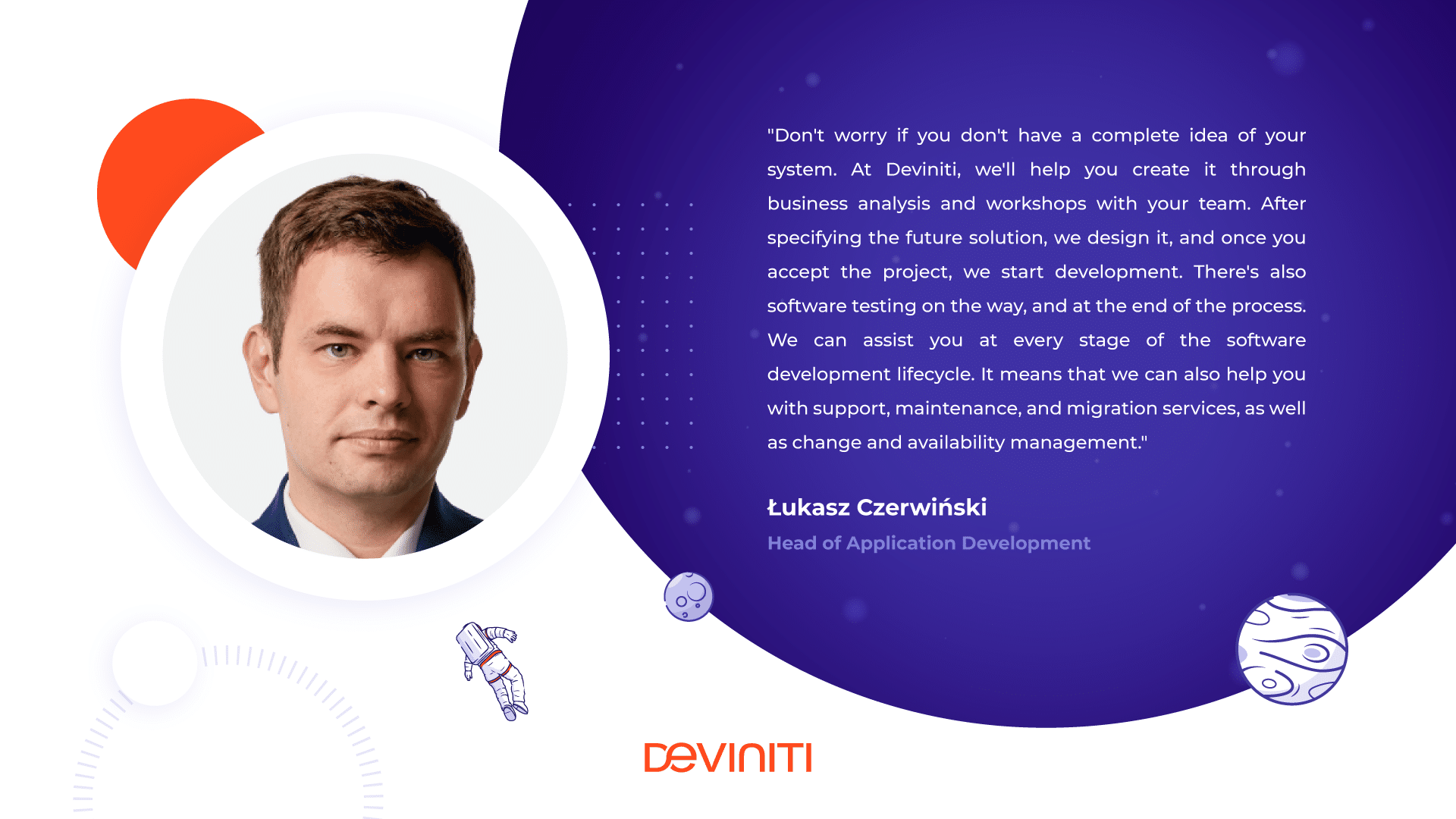How to choose a custom software development company to partner with

The companies come to think about custom software because of the problem or obstacle they encountered or the idea they had. It could be trouble with managing work in a team, massive data, or the vehicle fleet. No matter what the starting point is, you need reliable guides to lead you the whole way to the application release (or even further). We gathered aspects that will help you in the software company’s selection process and making the final decision.
Custom software is a type of system tailored to your needs. After providing them with your requirements, the software development company will create a solution working exactly the way you wanted. Before it happens and you select the most solid firm, you need enough time to review different companies. In fact, you start not only a long-term project and an expensive investment but also cooperation that will impact your business development direction. Then make yourself comfortable and go through our set of aspects worth taking into consideration during your research.
Gathering your requirements
Before you start looking for a software company, collect the requirements for your solution and your expectations towards your future cooperators. It’ll make your collaboration with a selected firm much easier, and its results will perfectly match your needs.
Project’s requirements
When the software professionals will know what you need, they’ll focus on building the best features to fulfill it. Start your process by thinking about why you need this solution, what is its purpose, what exactly you’d like this system to do, and who will use it. Then try to step into these end users shoes and ask yourself questions like:
- What do they need to do in this tool?
- How do they want that to happen?
- What problems should this product solve?
After you finish the previous part, go on to collecting functional and non-functional requirements. The first ones concerns functions that your software has to be able to perform, like the possibility to browse documents or download a registration form. The second ones are related to the system’s aspects like response time or reliability.
Expectations towards your software partner
In this step, think about who you’d like to work with. Try to determine which specialists you need, what competencies should they have, how and how often you’d like to communicate with them, where they should be located, and what company culture they should represent. It’s all because software development involves not only coding. The company performing it should be primarily your business partner. It means that you can come with a problem and they’ll help you make an idea out of it, find a solution, and finally – develop it.
You can also think about a technology you want your solution to be developed with. But don’t worry if you have no idea about it. The top-notch software development companies will listen to your needs, analyze the requirements and desired features to match them with the most suitable technologies and systems.
Research of software development companies
Once you’re ready with your product idea, requirements, and expectations, go forward to the phase of research. Browsing the development companies, comprehensively analyze their websites. What to focus on there?
- Quality of the webpage. Look if the company pays attention to the details.
- General information. Check the firm’s size, years of experience, and technology stack to make sure they’re qualified enough to be a reliable technological partner for your project.
- Company culture. Assess whether they have a partnership attitude towards employees and customers.
- Values and work ethics. Search also for their mission and vision to see if these all beliefs match yours.
Portfolio and blog
Case studies from the company’s past projects will help you imagine how they work. Take a look at the project’s scope, used technologies, and the developed features. Then read their blog to check whether they share business and technical knowledge and see if they’re experts in their field. Also, go to the general information about the company and check its size, years of experience, and technology stack to make sure they’re enough qualified and stable partners for your project.
Testimonials and referrals
Don’t limit your research to only what the company says about itself. Read or watch their customers’ opinions. Obviously, these testimonials were chosen and recorded by the company. To have a more objective image of their work, search for opinions about them on the internet, for example on the B2B research platforms like Clutch or GoodFirms. You can also ask about this company your friends and other companies you’re acquainted with. Then ask whether:
- the project fitted within budget,
- the project was delivered on time,
- there were changes to the original concept,
- the problems were handled and solved professionally and efficiently.
Project management style
The most common methodology described on the software development companies’ websites is Agile. It’s a good sign which tells about their organized way of work and quality of their products. But it’s better to choose a flexible partner who knows their way around different methodologies. This way they match the best project management style to the needs of a particular phase of the software development process.
Automated deployments
If you don’t have continuous integration and continuous delivery operational practices implemented but you want to, check whether the company you’d like to select uses the tools that automate software development processes. Such solutions reduce software development costs and time-to-market and increase software development and implementation efficiency.
Contacting chosen companies
Once you finish your in-depth research, make a list of companies you’d like to reach out to. There are matters which can’t be explained enough on the website or aren’t mentioned at all. In such a situation, you should ask additional questions directly to the company. Below you’ll see three aspects you can obtain more information about.
Software testing
It’s hard to develop flawless code. That’s why it’s important to get to know how the software testing process looks at the chosen company. Ask if they have a separate QA team, what type of tests they conduct, and whether they’re experienced in automated testing. The latter reduces testing efforts and improves accuracy.
Security
No matter if you work with sensitive data or not, the security matter should always be taken seriously. Make sure the considered company has an established security policy and a process related to it. You can also check if they’re compliant with international security norms, like ISO / IEC 27000 series standards, COBIT, or ITIL.
Workshops
Once you narrow your choice to three or four companies, you can ask if they offer design thinking workshops so that you could check their business competencies. Together with their team, you’ll do brainstorming to gather business problems you’d like to solve and the ideas for your product. You’ll discuss the ideas and pick the best of them. As a result of the workshops, the team will prepare a mock-up to show you how they’d answer your problem with the future product, how it could work, and what its developing phases would be. This way, you’ll see what ideas they have, and how developers, project managers, and business analysts approach the project. Also, after the workshops, you’ll have more insight into how the project scope could look. It’ll help you decide on the most optimal option for you.
Taking a closer look into what impacts custom software development cost
The price is an obvious factor that also determines choosing one company over the other. After surveying more than 150 international software development firms in 2018, GoodFirms determined that an average software development cost was 36 thousand dollars.
Source: GoodFirms
But before you decide to take a less expensive offer, let’s see what impacts custom app development cost.
Team
The developers are not the only ones present in the process. As mentioned above, there should also be testers involved. And if the user experience and design play a significant role in your project, UX specialists will surely be engaged. There’s always someone managing all these people like a team leader or project manager (or both). If the work requires so, a business analyst and software architect might also be part of the team. The project’s complexity and needs may also require specialists with a defined level of seniority. Experienced and talented professionals have to be rewarded accordingly.
Risk
Everyone would like to work smoothly on the project. But in reality, different obstacles can appear and inhibit progress. Let’s take technology as an example. Risk comes along, no matter if a new or old technology is chosen for the project.
New technology
Relatively fresh technology may have a lot of flaws because it’s still developed and tested. We also can’t be sure that it will be further developed in the next few years which affects future maintenance. What’s more, if the technology is popular, there’s a risk that the developers will leave during the project for another, better-paid job. The company may have troubles finding new specialists or to do so, they’ll be forced to pay them double.
Old technology
It can be hard for the company to find developers willing to learn old technology. Here the costs also rise since they could demand higher salaries for their efforts. Choosing an old technology, the firm has to use the old systems which is an extra cost as well.
Then before deciding on a technology, it’s important to answer the questions below.
- Is there a technology roadmap with a clear direction for its development?
- What technological stack is it based on?
- Will there be enough professionals to develop this technology?
- What are the costs of the developing and testing tools needed for this technology?
Also, you should be aware of the licenses’ charges. They can grow along with your product’s development. Then pay attention to how a particular license scales.
Business requirements and project scope
The project’s complexity also influences its final cost. The more advanced and complicated the features, the more time the team needs to develop it. Such work also requires expertise and experience. The same goes for UI/UX design. If it takes more time and effort of the designers to create a user-friendly solution, the final cost obviously rises. Some projects involve changing the whole system’s architecture which implicates software integrations and data migration.
Software integrations
Integrations with existing tools can be both easy and quick as complex and time-consuming. Developers working on them not only have to get to know your systems inside out, but also to create a custom way of connecting them with the new solution.
Data migration
While it may sound easy, data migration implicates a change in storage and database or application. Before moving it to another system, the specialists need to prepare extracted data for such an action.
Hosting
No matter which type of hosting you choose, it raises your costs. However, on-premise hosting is usually more expensive (you have to cover the costs of owning and maintaining at least one server). Meanwhile, cloud hosting operates on a pay-as-you-go model, which means you only pay for the resources that were actually used in the project implementation.
Maintenance and support
Post-development services also require having a solid process. Some of the companies use their valuable know-how here which can consist of already configured help desks, tried and tested ticketing process, and maintenance SLAs.
Select a reliable business partner
Choosing a custom software development company can be a long and effortful process, but it’s definitely worth it. You can get a tailored, scalable product, integrated with your existing tools. Take as much time as you need to go through all the above-mentioned criteria. Then select a company which will not only meet them but also your requirements. Most importantly, this firm should be a reliable and solid business partner which besides earning on your cooperation also wants you to benefit from it. Such added value can be for example using their business know-how to create the best possible product for you.
We have years of experience in developing custom software solutions and many skilled specialists on board. That’s why we can guide you through the whole software development lifecycle from idea, through design and development to maintenance and support. Take a look at our custom development services.
Also, check other articles on our blog:





